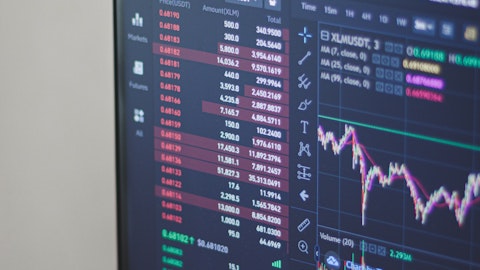Jeremy Barnum: Yeah. Okay. That’s a good question, Erika. I think there’s a couple of pieces in there. So let me take the most important piece first, which is the 17% through the cycle target. Are we keeping that or not in light of the Basel III endgame proposal? So short answer is we’re not going to change that number today. But when you look at what we’ve disclosed about a 25% increase in capital, it’s not — you have to start by acknowledging that, that is a major headwind to returns. In simple terms, you talk about earnings power and returns, but they’re two different things, right? We have to be a little bit pedantic and do numerator, denominator here. Okay. So say the numerator doesn’t change, if you just dilute down the numerator by the increased capital, that’s a significantly lower return number.
I would say that, that’s probably the lower bound in terms of the impact of the Basel III endgame for a couple of reasons. One is we are hoping for changes. Two is, once the rule is final, we will seek to reprice in the places where we can. And that will be different in consumer and in wholesale. Some of it will be product level, some of it will be relationship level. But that hopefully can mitigate some of it. But of course, the flip side of that is that’s cost getting passed into the real economy, and that’s part of the point that we’ve made about lowering availability of products and services and lending. There may be some opportunities for costless optimization. I’m personally a little bit more pessimistic about those, but we surprised ourselves on those points in the past.
So we’ll see. And then finally, yeah, we may stop doing certain things, and we may exit things. But I wouldn’t necessarily assume that, that’s going to do a lot to preserve returns at the 17%. That’s going to be about exiting things that are shareholder disruptive but not necessarily producing much higher returns if you know what I mean. So that’s that. And then the other part of your question implicitly was talking about organic capital generation, and I think it’s just very important to separate impacts on the economy and impacts on long-term returns from our ability to meet the requirements. Of course, as Jamie always says, JPMorgan is going to be fine. And we’re building a lot of capital, and we were managing capital conservatively. And we’ll be able to build the necessary capital in order to achieve on time or early compliance, which is always what we strive to do.
But that doesn’t really have any particular bearing on the question of what the long-term return target is or the impact on the real economy.
Erika Najarian: Got it. Thank you.
Operator: Thank you. Our next question comes from Glenn Schorr with Evercore ISI. You may proceed.
Glenn Schorr: Hi, thank you. So I very much appreciate the comments in the release on the big picture things of what’s going on in the world and the potential impact on markets, on crude market, global trade, everything that you mentioned. And sadly, agree about the most dangerous time in decades. The question I have is, does it surprise you that markets are hanging in that you yourself have green shoots or still green shoots type of mindset about banking while that’s going on? And then maybe more importantly, if you believe what — obviously, what you wrote, what are you doing about it? How do you manage yourself conservatively? How do you prepare for tougher times?
Jamie Dimon: Yes. Go ahead, Jeremy. Do you want to start?
Jeremy Barnum: Okay. So I mean, on green shoots, you’ll just note that our comments are cautious. I mean, there is momentum. I do think we are a little bit more optimistic than we were. But obviously, markets have been bumpy, both equity markets and rate markets have been very whippy recently. So we don’t want to get too carried away with optimism here. We are coming on off a very low base. And so there’s a hope and an expectation that we are on the path to normalization and improvement. And of course, the overall economic picture, at least currently, looks solid. The sort of immaculate disinflation trade is actually happening. So those are all reasons to be a little bit optimistic in the near term, but it’s tempered with quite a bit of caution.
Jamie Dimon: So I would add caution. There has been an extraordinary amount of fiscal monetary stimulus still in the system. And you can’t look at — and of course, it can drive markets and sentiment and sales and profits and all that, but it can’t stay like this forever. Between Q2, if you’ve never had, and how much the fiscal stimulus is going to continue at this rate before you have kind of [indiscernible] kind of factors. So I just — I think you have to be very cautious. And of course, the dealer policies, I think, is just an extraordinary issue we have to deal with. How do you prepare the company for that? We do 100 stress tests a week. And we do multiple views of it, including geopolitical problems or interest rate problems.
But usually, geopolitics presents itself as usually as a deep recession or a mild recession, a recession part of the world or markets going down a lot. And because markets do well is not a reason ever to say they’re going to continue to do well. If you don’t believe me, remember 1987, 1990, 1994, the year 2000, the year 2009, and people don’t predict those inflection points. I just — but my caution is that we are facing so many uncertainties out there. You just got to be very cautious [what you’re] (ph) facing. And like I said, the other thing about the green shoots regardless of that, we try to run the company so that we serve the clients day in and day out with better products and better services, securely, safely and all those things.
And that’s the ultimate goal. We know there are going to be bad times. That’s not a surprise as there are going to be bad times. We don’t always know how they’re coming and where they’re coming from, but we keep on serving clients, doing good for clients, you can build a good business kind of separate from what it does to your returns. That’s a slightly different issue at this point. But we’ll deal with that, too, when we figure out what to do.
Glenn Schorr: Thank you for all that.
Jeremy Barnum: Thanks, Glenn.
Operator: Thank you. Our next question comes from Mike Mayo with Wells Fargo Securities. You may proceed.
Mike Mayo: Hi. I understand the NII strategy benefited from First Republic asset sensitivity, TD strategy, money in motion. And I’m curious to how much is the NII increase and the deposit benefits a function of the 67 million digital banking customers. Do you have more digital banking customers and branch customers now? If you can just refresh that? And then a more general question, I guess, the first one for Jeremy, and the second one for Jamie. You have record tech spend. What’s the benefit of having record tech spend? If you can kind of mark to market your thoughts there as it relates to AI as it relates to maybe wasted spending, your outlook for next year? And does it really help to be the biggest tech spender of the banking industry?
Jeremy Barnum: Yes. Let me do digital banking, Mike. I spent some time on this actually a couple of weeks ago. And it’s interesting to note the sort of extent to which the growth in digitally engaged consumers is higher than the overall growth in consumer accounts, meaning that we’re continuing to increase the percentage of our consumers that are digitally engaged. And it sort of goes back to my prior point about…
Jamie Dimon: The percent who are digital-only is much lower than that.





